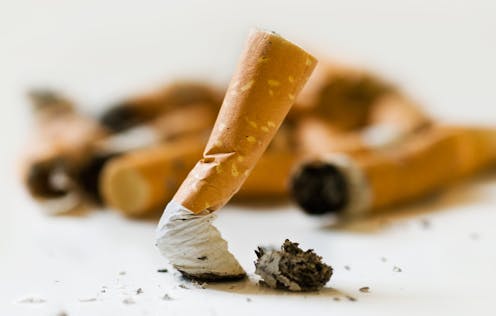Why tobacco companies' warnings about a black market are inflated – and misleading
- Written by Janet Hoek, Professor of Public Health, University of Otago

Tobacco companies claim to be transforming their business by “reducing the health impact[1]” of their products. Yet they often oppose the very policies that could achieve this goal.
British American Tobacco NZ supplies about two thirds of the New Zealand tobacco market. The company opposed policies outlined in the smokefree law[2] that came into force in January this year[3]. Instead, it proposed non-regulatory[4] approaches.
Among a suite of objections, the company claimed denicotinisation, reduced availability of tobacco, and the introduction of a smokefree generation would lead to serious unintended consequences. These included a tobacco black market that would fuel “drug trafficking, money laundering and other nefarious activities[5]”.
Independent research[6] analysing the data tobacco companies use to support these claims has documented numerous problems with the data collection, analysis and presentation. The effect has been to inflate estimates of illicit tobacco trade.
Other international studies[7] have examined the role tobacco companies themselves play in supporting illicit trade by attempting to control a global track and trace system and undermining the Protocol to Eliminate Illicit Trade in Tobacco Products[8].
Analyses of industry behaviour in low and middle-income countries found overwhelming historical evidence[9] of the industry’s complicity in illicit trade. For more than two decades, studies[10] have questioned tobacco companies’ claims that black market trade results from high taxation and noted how these companies are often the main beneficiaries of illicit trade.
Read more: Smoke and mirrors: why claims that NZ’s smokefree policy could fuel an illicit tobacco trade don’t stack up[11]
Who gains from black market scaremongering?
There are obvious risks to relying on industry evidence. In 2006, a US court found international tobacco companies acted with “intent to defraud or deceive[12]” the public about the harms from smoking for decades.
A New Zealand lobby group supported by tobacco companies appears not to have critically reviewed industry evidence but instead amplified the claims. Its submission during the consultation process for New Zealand’s smokefree legislation erroneously argued the measures would amount to prohibition[13]. It drew incorrect parallels with alcohol prohibition in the US.
Nicotine products will in fact remain available, either as approved treatments (such as nicotine replacement therapies) or through vaping products. Prohibition arguments are as baseless as they are misleading.
How do people who smoke view illicit tobacco?
We recently completed a study involving in-depth interviews[14] with 24 people who smoke. Very few of them reported personal interest in illicit tobacco products or had purchased illegally imported or stolen tobacco. The wide availability of other nicotine products in Aotearoa New Zealand may explain their comments.
Although few had used illegally-traded tobacco, nearly all had accessed and smoked homegrown tobacco. However, none had enjoyed using what some call “chop chop” and instead described homegrown tobacco as “vile” and “feral”. Rather than seeing homegrown tobacco as a long-term alternative once measures under the smokefree law are implemented, participants viewed using this tobacco as unpleasant and unsafe.
Read more: Forget tobacco industry arguments about choice. Here's what young people think about NZ's smokefree generation policy[15]
We found numerous contradictions in how participants expected an illicit market to evolve. Some thought it would grow, yet had little idea how people would access it. Some envisaged black market products being more expensive, while others thought they would be less so. Several expressed concern about the safety of sourcing and smoking product obtained through a black market.
These contradictions and the participants’ unfamiliarity with illegally imported tobacco suggest tobacco companies and lobby groups may overstate the problem. Rather than opt for non-regulatory[16] approaches over measures predicted to reduce smoking prevalence[17] very quickly, we should instead actively manage any threat illicit tobacco may pose.
The government has allocated funding[18] to a specialist team that will monitor and disrupt illicit tobacco. Ideally, this funding will enable greater X-ray surveillance of imports from countries identified as potential sources of illicit tobacco. New Zealand could also sign the Protocol to Eliminate Illicit Trade in Tobacco Products to access international illicit supply data.
Read more: NZ's smokefree law will reduce the number of tobacco retailers – here's what people who smoke think of that[19]
While improving monitoring and surveillance is important, reducing the size of any illicit market is arguably the strongest response to the alleged threat. The fewer people who smoke, the smaller the potential market size. The smaller the market, the less rewarding illicit trade will be.
The most potent response to claims that illicit tobacco trade will increase is to implement measures predicted to lead to a rapid drop in smoking prevalence[20]. Far from creating a case to dismantle measures outlined in the law, tobacco companies’ claims provide a compelling rationale for implementing the policies as rapidly and comprehensively as possible.
References
- ^ reducing the health impact (www.bat.com)
- ^ smokefree law (www.health.govt.nz)
- ^ into force in January this year (www.smokefree.org.nz)
- ^ non-regulatory (www.parliament.nz)
- ^ drug trafficking, money laundering and other nefarious activities (www.parliament.nz)
- ^ Independent research (tobaccocontrol.bmj.com)
- ^ international studies (tobaccocontrol.bmj.com)
- ^ Protocol to Eliminate Illicit Trade in Tobacco Products (fctc.who.int)
- ^ overwhelming historical evidence (tinyurl.com)
- ^ studies (tobaccocontrol.bmj.com)
- ^ Smoke and mirrors: why claims that NZ’s smokefree policy could fuel an illicit tobacco trade don’t stack up (theconversation.com)
- ^ intent to defraud or deceive (www.justice.gov)
- ^ amount to prohibition (www.nzinitiative.org.nz)
- ^ in-depth interviews (academic.oup.com)
- ^ Forget tobacco industry arguments about choice. Here's what young people think about NZ's smokefree generation policy (theconversation.com)
- ^ non-regulatory (www.parliament.nz)
- ^ predicted to reduce smoking prevalence (tobaccocontrol.bmj.com)
- ^ allocated funding (www.beehive.govt.nz)
- ^ NZ's smokefree law will reduce the number of tobacco retailers – here's what people who smoke think of that (theconversation.com)
- ^ rapid drop in smoking prevalence (tobaccocontrol.bmj.com)
















